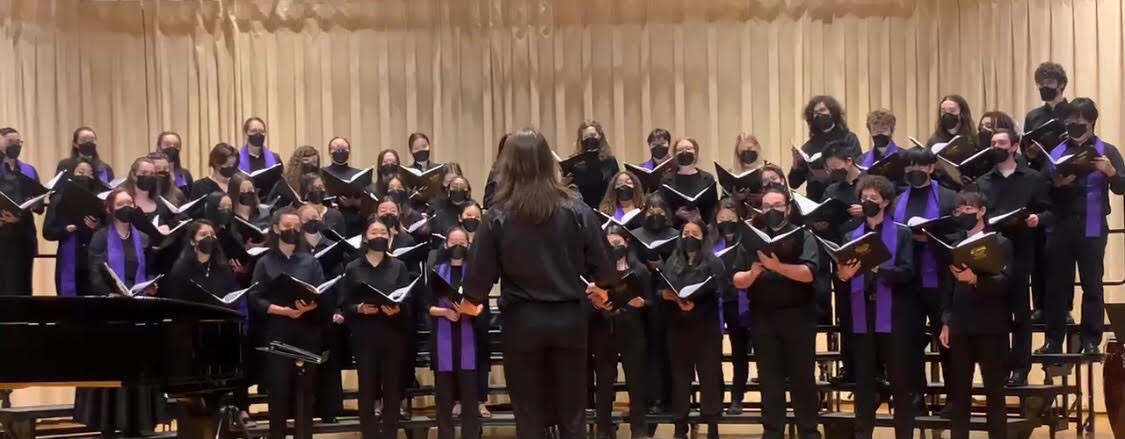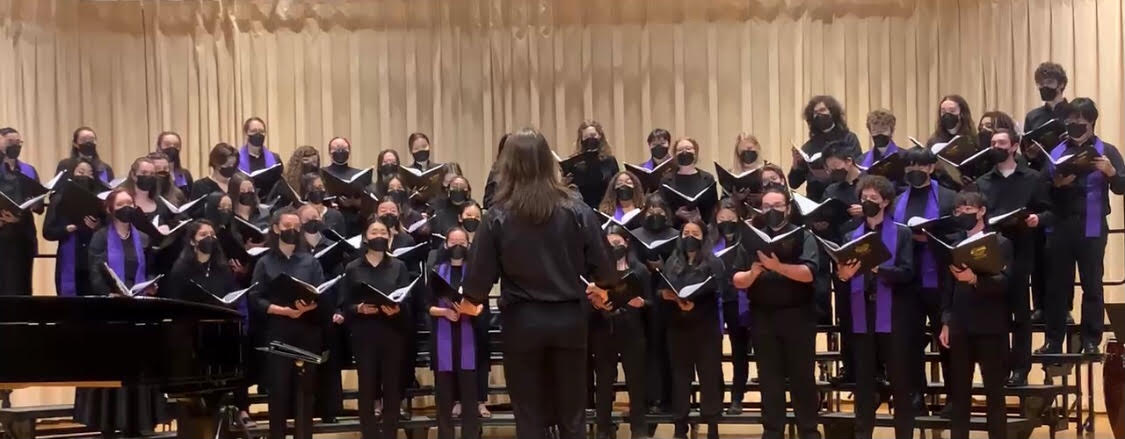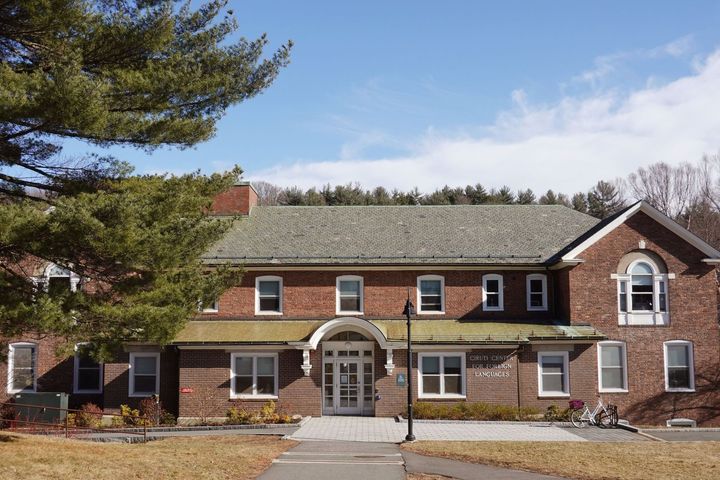Moved by a Melody: Choral Society’s Spring Concert
Last Friday, the Amherst College Choral Society performed their Spring concert, “Everlasting Voices.” Managing Arts and Living Editor Alex Brandfonbrener ’23 recaps their first performance since the Glee Club’s merger with Chorus.


On Friday, April 29, the Amherst College Choral Society performed their Spring concert in Buckley Recital Hall, titled “Everlasting Voices.” The performance featured a wide range of student voices, unified by a desire to find community through singing. It was the Choral Society’s first concert since Glee Club merged with Chorus to form a new, all-inclusive Glee Club earlier this semester. The concert managed to maintain the unique identities of the subgroups that form the Choral Society — Glee Club (the largest group), Concert Choir, and the Madrigal Singers — while also featuring an internationally diverse range of musical traditions.
The show opened with “Wangol,” a Haitian folk tune sung by the ensemble of the Glee Club. The song reflects on pre-Columbian Haitian history, lamenting the loss of King Wangol, who was beloved by his people: “Wangol, you are leaving. / When will I see you again? / The Country is changing …” The song was uplifting and pulsing with energy. The singers carefully navigated complicated rhythms, all while swaying in unison and projecting their voices through KN95 masks. It was a strong opening that demonstrated what the Glee Club has to offer, a stylistic overture for the rest of the concert.
Glee Club continued with “The Everlasting Voices,” an original arrangement by Sam Wright ’23. The piece combined lyrics from two culturally distinct sources: first, a Latin requiem, followed by a poem by William Butler Yeats. The style of the music built on the Celtic tradition of Yeats; it was careful and delicate, yet confident, too. The singers managed to balance somber and hopeful moments, drawing a sharp contrast from the first piece.
Next was “Migate Goran Yoru no Noshi o” (“Look Up at the Stars at Night”), sung by the Glee Club’s tenors and basses. The piece gained recognition after frequently being performed in Japan after the Tōhoku earthquake and tsunami in 2011; it is a song about hope for better times. The performance used the low tones of the tenors and basses to deliver a flowing, patient elegy that was not afraid to take its time. It was heartening to see the unique sound of Amherst’s historic Glee Club featured, even after merging with Chorus.
The Glee Club’s altos and sopranos followed with the Wailin’ Jennys’ arrangement of “The Parting Glass.” The song had a light, unresolved quality, punctuated by silent moments. It was as if they were calling out to the audience, relaying lyrics about nostalgia: “And all I’ve done / for want of wit / to mem’ry now I can’t recall / So fill to me the parting glass / Goodnight and joy be with you all ...”
Taking the stage next were the Madrigal Singers, a group of only five singers: Alexandra Conklin ’25, Cameron Mueller-Harder ’22, Patrick Spoor ’22, Kameron Melvin ’22 and Choral Society Assistant Director Gilbert Wemeling ’19. They sang three short pieces, each featuring a distinct style of acapella voice. “Since Robin Hood” was playful, jesting and joking, a complicated interplay of arpeggios between the five. Featuring lyrics from an Emily Dickinson poem, “Dawn” was longing, a swirl of fleeting emotions that left as soon as they came. The Madrigal Singers closed with “My heart doth beg you’ll not forget,” a hymn with a sincere and gracious sentiment. I was impressed that these five singers could hold the stage so completely, even while the rest of the concert featured many more voices.
The performance continued with the Concert Choir, a more selective subgroup of Choral Society. They began with “Tchaka,” to prepare for which the singers had met with the song's composer, Sydney Guillaume, on Zoom. Tchaka is a Haitian stew eaten during festive times; in musical form, percussive folklore rhythms were the spices of the piece. It was upbeat, dynamic, celebratory and a little bit dramatic, and the singers brought out unusual flavors in the composition.
“Water Night,” a lonely but strong-willed melody followed, evoking the feelings of looking at a body of water: “And if you close your eyes, / a river, a silent and beautiful current, / fills you from within, / flows forward, darkens you …” It was introspective yet impassioned, using a fluidly dynamic range, switching from loud to quiet very quickly.
The Concert Choir finished with “Alleluia,” another piece for which the group worked with the composer, Jake Runestad. The song consisted of a single lyric, repeated again and again. It did not feel repetitive, however, and the singers found clarity in the opaque tones and shapes in the piece’s mystifying melody.
To wrap up the night, the Glee Club filled the stage again At this point in the concert, I began to look for themes connecting the pieces. Indeed, I found a concise moral about resilience in the face of insurmountable difficulty. First was “Lao Rahal Soti” (“If My Voice is Gone”), a protest song about continuing to fight for a cause, even after being silenced. Julissa Tello ’23 began the piece alone, singing in Arabic, genuinely and simply. The rest of the ensemble soon joined her, voicing a fragile and joyful tune. Their next piece, “Because You Sang,” featured Shuyao Charlotte Wang ’24 as conductor. Taking stylistic influence from the American “Sacred Harp” musical tradition, the piece evoked feelings of empowerment and told a story of overcoming adversity. It was fitting that after the concert, the Choral Society collected donations to aid Ukraine, as a nod to the greater impetus behind their artistry.
My favorite piece was “John the Revelator,” a blues bop with an inquisitive and demanding presence that seemed to say, “Listen to me …” The performers looked like they were having lots of fun, bouncing along to the music and clapping, a vibe accentuated by the creative improvisations of pianist Maura Glennon.
The concert closed with two songs that brought the spirit of Amherst College to the music. First was “Three Gifts,” a commemorative piece written by Lisa Smith Van der Linden ’89. I had heard the Choral Society perform this song before at events like Convocation and Commencement. But for the first time, I listened to the haunting word in the wind — “Amherst, Amherst, Amherst …” — with a feeling of nostalgia. The singers voiced the lyrics of the piece with unwavering appreciation: “Thank you Amherst for three places you’ve given me: A place right here, a place for roots. / A growing place, a greening place …”
“Senior Song” was last, which the Choral Society has traditionally sung as a stoic farewell to the group’s seniors. Each singer from the Class of 2022 stood out front, sporting purple sashes and holding a cup for toasting. In the past, the seniors drank from a 150-year-old chalice, but they could not this year because of Covid concerns. It was still a celebratory moment, though, as each senior singer punctuated the song by taking a big sip of their cup, to the audience’s giggles.
The show closed with the lights in Buckley dimming to darkness. As someone who had never been to a Choral Society concert before “Everlasting Voices,” I was struck by the light-hearted yet resilient nature of the singers and music. These students took time to sing to their friends and family, even during the busiest time of the semester. I am glad to have watched and listened.





Comments ()